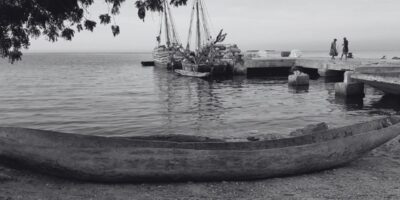Illegal boats providing unauthorized transport are « under the authority of gang leaders », a SEMANAH executive discloses AyiboPost
On June 2, 2023, due to unfavorable weather conditions, officials from the Maritime and Navigation Service of Haiti (SEMANAH) prohibited the departure of the vessel Métropole, which was then covering the Anse-à-Pitres/Marigot route, reports Gilbert Guichard, a coast guard inspector, to Ayibopost.
The ship’s captain defied the order, says Guichard.
A few kilometers from the port of Marigot, Métropole ran aground. Erold Champagne, coordinator of SEMANAH’s territorial representations, confirms with AyiboPost that two deaths and fourteen survivors were recorded.
Similar incidents are multiplying in the country. According to a nautical accident report sent to the editor by Champagne, nine accidents at sea were recorded in Haitian waters between October 2022 and June 2023, with a total of almost ten deaths and over twenty survivors.
The boat’s captain defied the order. A few kilometers from the port of Marigot, Métropole ran aground.
SEMANAH is responsible for regulating sea travel, and the Coast Guard acts as the institution’s armed wing.
However, more than five interviews conducted by AyiboPost with executives from both institutions reveal structural problems, preventing them from functioning and endangering the lives of maritime transport users.
Read also : Gangs engage in boat piracy in Haiti
Erold Champagne commends the efforts made by the institution in a difficult climate.
He admits, however, that some boats are not registered or in good standing with SEMANAH’s registration department, due to their obsolescence and overloading.
According to the official, irregular boats providing unauthorized transport are « under the authority of gang leaders » and are increasingly found in anchorages. According to Champagne, the captains of these vessels do not answer to the authority of SEMANAH.
Some captains, greedy for profit, double the number of passengers and loads, among other things, according to the coordinator.
More than five interviews conducted by AyiboPost with executives from both institutions reveal structural problems, preventing them from operating and endangering the lives of shipping users.
Plagued by shortages, the coastguards, who are the armed wing of SEMANAH, are unable to carry out their missions properly, according to revelations from two members of the institution to AyiboPost.
Because of the insecurity that renders some of the country’s main thoroughfares inaccessible, many improvised and irregular embarkation points, where passengers take unregulated makeshift boats, are operating in the country, Gilbert Guichard told AyiboPost. One of these illegal ports is in Carrefour, reports the official.
Discover : Photos | Des camions prennent la mer à Carrefour pour rentrer à Port-au-Prince
« SEMANAH agents and coastguards are underpaid and deprived of appropriate equipment, » adds Guichard, who mentions a meager fuel allowance, preventing inspectors from carrying out regular interventions at sea.
Often, « crew captains arrested for violating voyage regulations are released at the drop of a hat, thanks to family or political connections, » laments Guichard.
Some boats are not registered or in good standing with the SEMANAH registration department, due to their obsolescence and overloading.
There is also a lack of synergy between SEMANAH and the Haitian National Police (PNH), according to sources.
When SEMANAH agents intercept a sailboat or vessel that does not comply with the rules of navigation, and they call on the PNH for assistance, « the latter acts indifferent, sometimes using a lack of manpower as an excuse for the operation, » according to Erold Champagne, SEMANAH coordinator.
For example, the number of passengers should be proportional to the number of life jackets on board – a prerequisite for departure.
Read also : Des pirates viennent pêcher illégalement en Haïti
A former ship inspector, Erold explains that he has sometimes received threats from some captains when asking them to respect this principle.
Despite repeated requests, AyiboPost was unable to obtain an interview with Cerome Carlo Elisca, Director of Marine Environmental Protection. Nor was the editorial team able to interview Éric Prévost Jr, Director General of SEMANAH.
A former ship inspector, Erold explains that he has sometimes received threats from some captains when asking them to respect this principle.
Corruption seems to be bringing down the state supervision of maritime traffic in Haiti, according to a source interviewed by AyiboPost.
Amos Pierre-Louis, a young man from Cabaret, claims to have personally witnessed a shocking scene on June 8, 2023 at the Jérémie wharf. A SEMANAH inspector allegedly lifted a departure ban for a boat, after an « exchange of money, » despite unfavorable weather.
« The journey was very hard, » the young man tells AyiboPost.
The sea was very rough. The gusts of wind and the pounding of the waves hit the boat hard as it pitched to starboard and port, with movements that mimicked the jerky violence of the waves, describes the young man. « The boat’s hundred or so passengers were nauseous, » laments Pierre-Louis, who says he broke out in a cold sweat.
SEMANAH falls under the Ministry of Public Works, Transport and Communications (MTPTC). According to a ministerial decree adopted in March 1982, the institution regulates and controls Haiti’s maritime waters, whether coastal, regular or international.
Read also : C’est la marine américaine qui surveille la majorité des eaux territoriales haïtiennes
Since 2017, navigation at sea in Haiti has been governed by the « Maritime and Navigation Code » passed in 2017 by the Haitian parliament.
When SEMANAH agents intercept a sailboat or vessel that does not comply with the rules of navigation, and they call on the PNH for assistance, « the latter acts indifferent, sometimes using a lack of manpower as an excuse for the operation, » according to Erold Champagne, SEMANAH coordinator.
According to this legal framework, vessels flying the Haitian flag and sailing in the country’s territorial waters must obtain a seaworthy permit, draw up a duly identified passenger list to be signed by the captain or any other authorized crew member, not overload the boats, etc.
Dysfunctions in the regulatory system are causing concern in civil society. In a public note dated June 26, 2023, the Platform of Haitian Human Rights Organizations (POHDH) describes the fact that agents do not hesitate to allow themselves to be bribed by sailors and captains of public transport boats to give them travel authorizations, in defiance of the risks people incur.
According to Alermy Piervilus, a POHDH official interviewed by AyiboPost, these malfunctions are « a sword of Damocles pointed relentlessly at the lives of people traveling by sea in Haiti ».
English translation by Sarah Jean.
Cover Image : In November 2020, repair work was carried out on the island of La Gonâve and on the Côte des Arcadins. | © SEMANAH/Facebook
Watch our special documentary released in April 2023 on the clandestine sea journey, commonly referred to as « pran kanntè » in Haiti:
Stay in touch with AyiboPost through :
► Our WhatsApp channel : click here
► Our WhatsApp Community : click here
► Our Telegram canal : click here







Comments